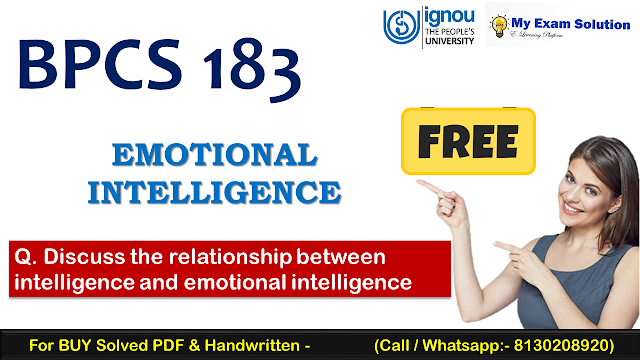Discuss the relationship between intelligence and emotional intelligence
Intelligence has long been regarded as a crucial aspect of human cognition and problem-solving abilities. However, the concept of intelligence has evolved to encompass more than just cognitive abilities.
Emotional intelligence (EI) emerged as a complementary construct that acknowledges the importance of emotions in human functioning.
Defining Intelligence and Emotional Intelligence:
Intelligence, commonly measured by IQ tests, refers to a person's cognitive abilities, including reasoning, problem-solving, memory, and knowledge acquisition. It has traditionally been considered a strong predictor of academic and professional success.
Also Read-
- Explain The Concept Of Emotional Competencies And Describe The Five Emotional Competencies Given By Goleman
- Explain Self-Control And Describe The Strategies To Develop Self-Control
- Explain The Meaning Of Emotional Competence
Discuss the relationship between intelligence and emotional intelligence-On the
other hand, emotional intelligence (EI) refers to the ability to identify,
understand, manage, and utilize emotions effectively in oneself and others. EI
encompasses skills like self-awareness, empathy, emotional regulation, and
social competence.
Differentiating
Intelligence and Emotional Intelligence:
While both intelligence and emotional intelligence are valuable, they operate in different domains and address distinct aspects of human functioning. Intelligence predominantly focuses on cognitive abilities and logical reasoning, whereas emotional intelligence centers around emotions, relationships, and social interactions.
Discuss the relationship between intelligence and emotional intelligence-A
person can possess high cognitive intelligence but may lack emotional
intelligence and struggle with understanding and managing emotions effectively.
The
Relationship between Intelligence and Emotional
Intelligence:
1. Emotional Intelligence as a Component of Intelligence: Emotional
intelligence can be seen as a subset of overall intelligence. It complements
cognitive intelligence by enhancing a person's ability to navigate social
situations, build relationships, and regulate emotions. The integration of
emotional intelligence within broader intelligence allows individuals to
leverage their cognitive abilities effectively in social and emotional
contexts.
2. Emotional Intelligence Enhancing Cognitive Abilities: Emotional
intelligence positively influences cognitive processes. Emotionally intelligent
individuals are better able to manage stress, handle conflicts, and make sound
decisions in emotionally charged situations. By regulating their emotions, they
can think more clearly, maintain focus, and solve problems effectively. Thus,
emotional intelligence enhances cognitive functioning and optimizes the
utilization of intelligence.
3. Intelligence Facilitating Emotional Intelligence Development:
Intelligence plays a role in facilitating the development of emotional
intelligence. Cognitive abilities enable individuals to comprehend and analyze
emotional information, understand complex emotional states, and recognize
patterns in emotional expressions. Higher cognitive intelligence provides a
foundation for individuals to learn and integrate emotional intelligence
skills, such as emotional awareness and empathy.
4. The Role of Overlapping Abilities: Certain cognitive abilities and
emotional intelligence skills overlap, reinforcing the interplay between the
two constructs. For instance, self-awareness, an essential aspect of emotional
intelligence, involves recognizing and understanding one's own emotions. It
also requires cognitive abilities, such as introspection and metacognition, to
accurately identify and reflect upon one's emotional experiences. Similarly,
empathy, a crucial component of emotional intelligence, involves cognitive
processes, such as perspective-taking and theory of mind, to understand and
share others' emotions.
5. Contextual Interaction: The relationship between
intelligence and emotional intelligence can vary depending on the context. In
certain situations, high cognitive intelligence may overshadow emotional
intelligence, leading to difficulties in managing emotions and relationships.
Conversely, in other contexts, emotional intelligence may play a more
significant role, such as in leadership positions, where the ability to
understand and motivate others becomes critical.
Intelligence and emotional intelligence are interconnected but distinct constructs. Intelligence encompasses cognitive abilities, while emotional intelligence emphasizes emotional awareness, regulation, and social competence. However, these constructs are not mutually exclusive; they influence and enhance each other in various ways. Emotional intelligence complements intelligence by optimizing cognitive functioning in social and emotional contexts, while intelligence provides a foundation for the development of emotional intelligence skills.
Discuss the relationship between intelligence and emotional intelligence-Recognizing and cultivating both cognitive and emotional intelligence can contribute to a well-rounded individual capable of navigating complex social environments and making informed decisions that consider both cognitive and emotional aspects.







0 comments:
Note: Only a member of this blog may post a comment.